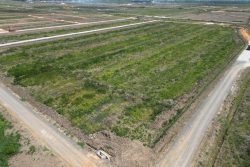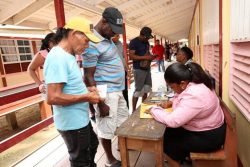Much more progress is required on the legislative front to be able to effectively report on the extractive industries, according to Guyana‘s Extractive Industries Transparency Initiative (EITI) Multi-Stakeholder Group member Vanda Radzik.
“We are still not up to speed as the more developed countries are but we remain committed. Both the past and present governments indicated that they are committed to the EITI and that is very good. Our legislation is also not up to par with others and we have to work on that,” Radzik said during a brief interview with Sunday Stabroek.
EITI is a global standard to promote open and accountable management of natural resources. It seeks to strengthen government and company systems, inform public debates, and enhance trust. In each implementing country, it is supported by a Multi-Stakeholder Group (MSG) comprising government representatives, extractive company officials and civil society organisations working together.
After completing the sign-up requirements for EITI implementation, Guyana applied for admission to the EITI on the 18th of August 2017.
Radzik is one of three civil society members on the MSG – which is the decision making body of the GYEITI.
Guyana has produced two country reports since joining the EITI and is now compiling its third one accounting for the 2019 financial year. The deadline for the report is May 31, 2022, and is being prepared by the United Kingdom-based consultant firm BDO LLP. The company also prepared the two previous reports.
“An IA [Independent Administrator] has been contracted and approved by MSG to provide technical assistance to MSG for compilation of the report. The reports track the progress being made in the implementation of the EITI Standard. You know with the COVID pandemic and so, things have slowed down so what the EITI International Board has said is that just for this year we have the option of flexible reporting.
“In this flexible reporting allows for some leeway in full reconciliation. We have had somewhat of an informal progress update on the current report and that is going well. They are in the process of preparing it and we are hoping to have an interim report before the deadline that way we can examine the progress that was made and offer a rationale for what we have not implemented as yet,” Radzik said.
The EITI Standard sets out the requirements that countries need to meet to be recognised, first as EITI Candidates and subsequently as being an EITI Compliant country. The Standard is overseen by the EITI Board, which comprises 20 members representing implementing countries, supporting countries, civil society organisations, and industry and institutional investors.
The extractive industries in Guyana comprises mining, forestry, fishery and oil and gas.
The 2018 report identified that the Guyana Mining Act (1989) does not include any express restrictions on the public disclosure of mineral agreements and licenses by the government. It recommended that the GYEITI Secretariat maintain an archive of copies of all active mineral agreements which can subsequently be included on the GYEITI website as a means of transparency. That was also flagged in the first report.
The report also identified inconsistencies in reporting and reconciliation of revenues while calling for the government to amend Section 23 (1) of the Revenue Authority Act (1996) and Section 4 of the Income Tax Act (1929) to allow the information required for EITI reporting to be disclosed to the Independent Administrator for the purpose of compiling GYEITI reports.
For the oil and gas sector, it had recommended that the government conduct, and use recommendations emanating from a comprehensive study of the legal, regulatory and institutional framework for the sector. Additionally, the government was urged to hire consultants to conduct relevant studies on legislative reforms needed for the sector and formulate draft amendments, legislation to bring existing laws and regulations up to par with the best practices.
Countries can be penalized for not complying with the EITI standards when assessed by the international board.







